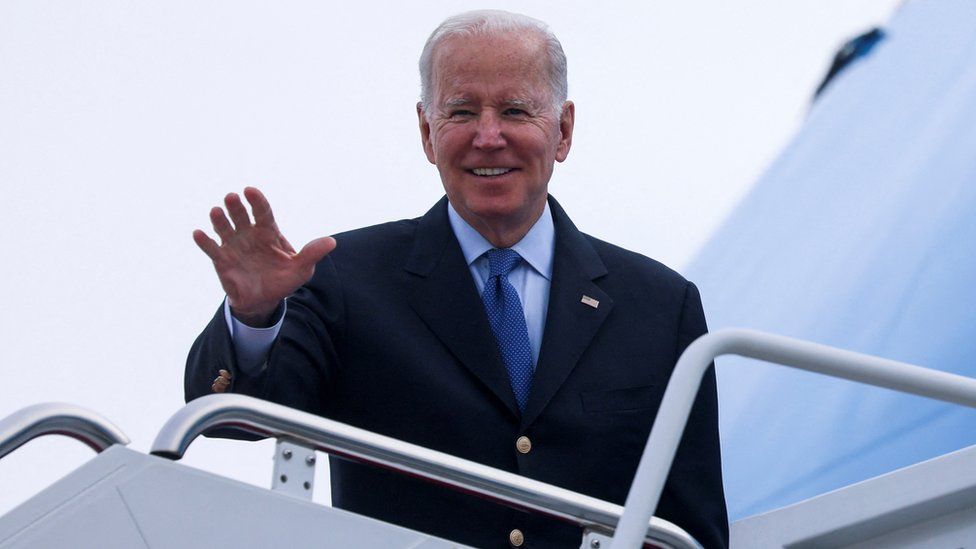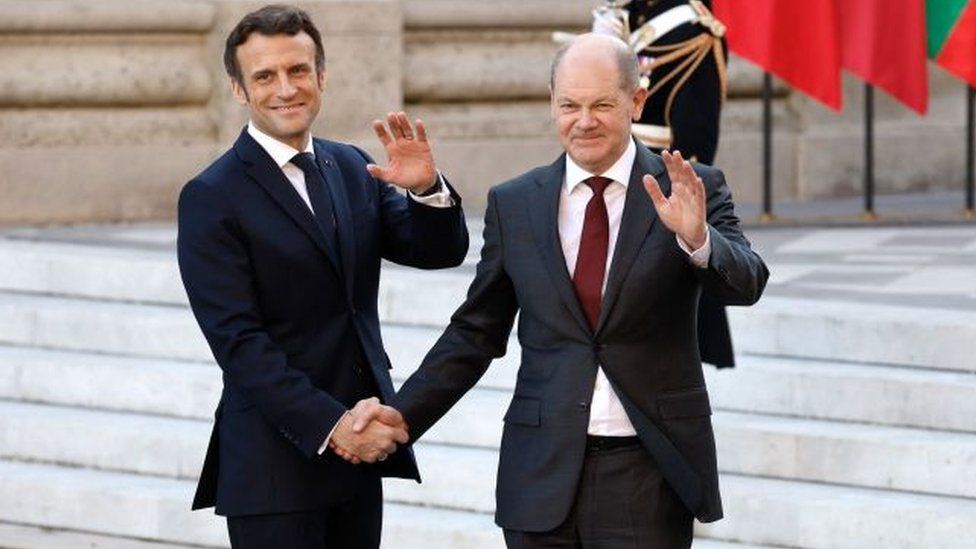
Western leaders meet to discuss Ukraine support
Thursday, March 24, 2022
Edit
US President Joe Biden joins fellow Western leaders in Brussels on Thursday for three summits on Russia's war in Ukraine, a month after the invasion began.
Nato, the G7 and the EU are all holding meetings, in a display of unity rarely seen by the West.
Mr Biden will take part in all three, the first ever visit by a US president to an EU summit in Brussels.
But his visit to Brussels is not just about symbolism.
Russia's invasion of Ukraine has given the Western defensive alliance Nato a renewed sense of purpose. And as the EU attempts to sever energy ties with Russia, it needs to forge and reinforce other relationships, particularly with the US.
Ukrainian President Volodymyr Zelensky was due to appear by video link at all three summits.
Nato's 30 presidents and prime ministers will agree greater support for Ukraine and new troop deployments for Eastern allies. Their aim is to show solidarity to Kyiv, though only up to a point.
Many, but not all, have been willing to supply weapons. The UK said it would use both the G7 and Nato meetings to "substantively increase defensive lethal aid to Ukraine".
But the alliance has also made clear it won't become more directly involved and Mr Zelensky's repeated requests for a no-fly zone over Ukraine have pretty much been ignored.
Nor is it clear how Nato would respond if Russia were to dramatically escalate the conflict in Ukraine - such as an attack on a Western weapons convoy, the use of chemical, or even tactical nuclear weapons. Nato's red lines have so far been drawn at its borders.
Why can't Ukraine join Nato?
Collective defence
For the past few weeks, 30,000 Nato troops from 25 countries have been training in Norway as part of Exercise Cold Response, a long-planned exercise that has now taken on more significance.

Soldiers from Sweden, which is not part of Nato, joined thousands of troops on exercise in Norway
Like Ukraine, Norway borders Russia. The key difference is that, as a Nato member, Norway is covered by a commitment to "collective defence" - an attack on one is an attack on all.
"I think an exercise like this is pretty good to have, to prove to countries like Russia… that you don't want to mess with Nato," a young Norwegian conscript called Peder told the BBC.
Nato leaders are focused on how to boost their own defences. They've already sent thousands more troops to the alliance's eastern flank, along with more air defence batteries, warships and aircraft.
Five challenges for Biden in Europe
Nato to send more troops to Eastern Europe
This, says Secretary-General Jens Stoltenberg, is the "new normal" following Russia's invasion of Ukraine. Russia will get exactly what it didn't want - more, not less Nato near its border. Nato battlegroups will stretch all the way from the Baltic to the Black Sea for the foreseeable future.
Two EU countries that are not members of Nato - Sweden and Finland - contributed troops to the exercise in Norway. They appear to be edging closer and closer to Nato in the wake of Russia's invasion.
President Trump once questioned the very existence of Nato and French President Emmanuel Macron once called it "brain dead". But President Biden's visit to Brussels is proof that he sees it as being more important than ever to curb a more aggressive Russia.
Dizzying EU unity
Defence strategy will also play a part in an EU summit where leaders will approve plans that aim to pull member states closer together on military planning, intelligence and procurement. One ambition is to have a rapidly deployable force of 5,000 troops.
It's all part of the theme of "strategic autonomy" championed by Mr Macron.
The argument is that a more sovereign Europe is a safer Europe, whether that's by securing reliable supplies of energy and semiconductor chips or by boosting military spending.
But the trickiest subject for the European Union's 27 member states is fast becoming the future of energy supplies, as they try to look beyond Russia.
After an initial, dizzying display of unity on sanctions across all 27 member states there are now obvious ruptures over what to do next.

EU leaders have reacted fast to Russia's invasion with a series of hard-hitting sanctions
German Chancellor Olaf Scholz has publicly denounced the idea of banning Russian gas and oil imports, arguing it will drag Europe into a recession. "Sanctions must not hit the European states harder than the Russian leadership. That is our principle," he said on the eve of the summit.
'Blood money'
Soaring energy prices are also a concern to be discussed by EU leaders on Friday.
But there are nations agitating for action as they voice deep discomfort about handing cash to the Kremlin via energy payments. "It's blood money," said one central European diplomat. "I don't think some countries understand the gravity of the situation."
President Biden's ability to offer Europe more US Liquefied Natural Gas is a key watch at Thursday's summit. The US is the world's largest producer of natural gas.
He is also expected to announce more sanctions on Russian political figures as well as so-called oligarchs.
But the prospect of fresh EU sanctions this week is being played down. Some in Brussels call it "fatigue", while others insist it's the right time to take stock.
Originally publised on BBCNews
